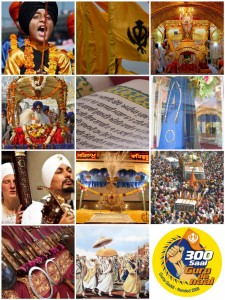
Like so many Sikhs and friends of Sikhs, I was in Yuba City that past weekend for what is the closest thing to a “jor mela” that America has to offer.  Lot of colorful Sikhs, lost of seva, and lots of food, lots of people selling lots of things.
Lot of colorful Sikhs, lost of seva, and lots of food, lots of people selling lots of things.
One of the things that I think stood out among the many “lots” and was that there were lots of Sikh t-shirts. People were wearing anything from the “300 Saal Guru De Naal” to t-shirts with famous Sikhs to the Sikh T’s that also happened to say “Happy Birthday Jesse.” Anyhow, the point is that there was a large variety of different t-shirts and this is cool because it show a sense of comfort and identity.
Recently, I read an article discussing how a group of four Sikh teenagers on the East Coast started a line of t-shirts with inside jokes for Punjabi Sikhs. The group, branded Turbaninc, says that their motto is:
As readers may have seen, we’ve been swept up with the elections here at TLH, and many of us are out volunteering and (wo)manning the polls today. As a Sikh-American woman and the daughter of Punjabi immigrants, this day is especially important to me — my right to vote is the product of over 100 years of activism to extend the rights of citizenship to all.
For those who are eligible and registered to vote in the U.S., I hope you’ll take today to cast your ballot. Whether you are voting for President, or for local initiative measures, or for state/local offices, you hav an exceptional opportunity to make your voice heard.
Below is some historical background on the extension of citizenship rights; hopefully it will get you pumped to participate:
- 1868: The Reconstruction Amendments eliminate non-criminal slavery (Amendment 13) and create a Constitutional right — in theory — for former-slaves and their descendants to fully participate in the post-Civil War U.S. (Amendment 15).
- 1913: The 17th Amendment allows for direct election of Senators.
- 1920: After nearly 70 years of lobbying, women win the right to vote.
- 1923: The U.S. Supreme Court revokes the citizenship rights of desi immigrants.
- 1940-47: Congress recognizes Native Americans as citizens, and over the next 7 years states incorporate them into their voting apparatus.
- 1946: Harry Truman gives back the right to naturalize, allowing desis and Filipinos to become citizens, once again.
- 1964: The 24th Amendment eliminates the poll tax (for federal elections).
- 1965: 100 years after Reconstruction, the Congress upholds everyone’s right to vote (including people of color and the poor) and criminalizes voting discrimination/disenfranchisement. It eliminates poll taxes (for state elections), literacy tests, and English-only language requirements.
- 1971: The voting age is lowered to 18.
- 2005: Indiana limits the right to vote to individuals with state/federal ID, only. The Supreme Court affirms their law.
For more information, here’s an annotated timeline of the development of voting and its slow inclusion of non-propertied and non-white individuals, and later women and immigrants.
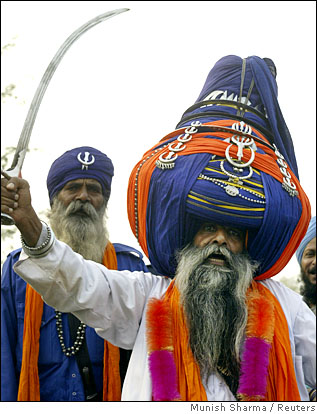
“Major Singh, a Nihang or a Sikh warrior, wears a head wrap that is about the length
of four football fields during a religious procession in Amritsar, India.”
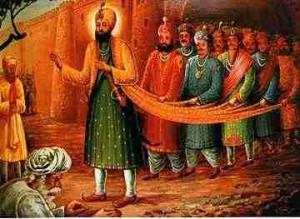 Many Sikhs participate in the celebrations of Diwali, the festival of light, without actually knowing what the significance of the date is in Sikh history. I can admit that for a long time, Diwali didn’t hold much importance for me because I didn’t fully understand why we celebrated it. In fact, today is not only Diwali but also marks Bandi Chor Diwas a day where Sikhs join together to celebrate the release of the sixth Nanak, Guru Hargobind Ji from imprisonment. The historic event itself should be acknowledged with significance – particularly the fact that upon order of his release from Gwalior Fort, Guru Hargobind Ji refused to leave unless the 52 princes who had also been imprisoned would also be allowed to leave. Thinking of others’ rights were more important than simply thinking of his own.
Many Sikhs participate in the celebrations of Diwali, the festival of light, without actually knowing what the significance of the date is in Sikh history. I can admit that for a long time, Diwali didn’t hold much importance for me because I didn’t fully understand why we celebrated it. In fact, today is not only Diwali but also marks Bandi Chor Diwas a day where Sikhs join together to celebrate the release of the sixth Nanak, Guru Hargobind Ji from imprisonment. The historic event itself should be acknowledged with significance – particularly the fact that upon order of his release from Gwalior Fort, Guru Hargobind Ji refused to leave unless the 52 princes who had also been imprisoned would also be allowed to leave. Thinking of others’ rights were more important than simply thinking of his own.
To me, the day is a reminder of the concept of Sarbat da Balla, or the welfare of all. Sarbat da Balla is a guiding principle that hopefully makes our words and actions bring about positive change to the greater good. As we approach the upcoming election (7 days to go!), it is these principles that should help advise us on those issues that affect not just ourselves but the collective good. While the economy is the principal concern on the minds of most voters, healthcare is an important issue that will also sway votes in a meaningful way.
A recent Kaiser Family Foundation poll shows that voters agree that in the face of a struggling economy “it is more important than ever to take on health care reform.”
Among Democrats, expanding coverage for the uninsured ranks second, named by 35 percent of those voters. Coverage also ranks second for political independents, named by a somewhat smaller proportion (23 percent). Relatively few Republicans (9 percent) name coverage as a health care priority. Most Democrats (69 percent) and half of independents (51 percent) think that universal coverage would help the overall economic situation in the United States, while only 34 percent of Republicans agree. [link]
 The Sikh American Legal Defense and Education Fund (better known as SALDEF, and SMART before that) has been vigorously defending a turbaned Sikh man, Sukhbir Channa, who was told by Disney that he would not be hired for a position because he did not have the “Disney look.” Angela Bliss, a spokesperson for Disneyland, explained that, “The Disney look is a fresh, clean and approachable look, ensuring that every guest feels comfortable with our entire cast.” Apparently a turbaned Sikh is neither fresh, clean, nor approachable, and makes others uncomfortable. Apparently in a “magical” environment that contains oversized pigs, mice, and other characters, it is a human with a simple religious headdress that is unwelcome. Apparently a major company whose creations are an integral part of practically every American child’s upbringing cannot teach those very children the fundamental values of tolerance, respect, and acceptance in this increasingly diverse and pluralistic nation. Rather than work to alleviate any possible (though not demonstrated) discomfort with a turbaned Sikh, Disney has pandered to and thereby legitimized the notion that turbaned Sikhs are to be marginalized and excluded from aspects of American society. I could go on and on.
The Sikh American Legal Defense and Education Fund (better known as SALDEF, and SMART before that) has been vigorously defending a turbaned Sikh man, Sukhbir Channa, who was told by Disney that he would not be hired for a position because he did not have the “Disney look.” Angela Bliss, a spokesperson for Disneyland, explained that, “The Disney look is a fresh, clean and approachable look, ensuring that every guest feels comfortable with our entire cast.” Apparently a turbaned Sikh is neither fresh, clean, nor approachable, and makes others uncomfortable. Apparently in a “magical” environment that contains oversized pigs, mice, and other characters, it is a human with a simple religious headdress that is unwelcome. Apparently a major company whose creations are an integral part of practically every American child’s upbringing cannot teach those very children the fundamental values of tolerance, respect, and acceptance in this increasingly diverse and pluralistic nation. Rather than work to alleviate any possible (though not demonstrated) discomfort with a turbaned Sikh, Disney has pandered to and thereby legitimized the notion that turbaned Sikhs are to be marginalized and excluded from aspects of American society. I could go on and on.
This week, I learned that another major company informed a Sikh that a turban should not be worn in the presence of customers.
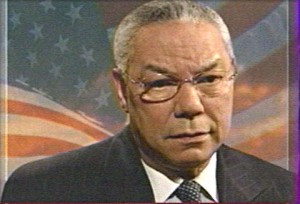 One aspect of the 2008 Election is reminiscent of the Sikh community’s response to the September 11, 2001 terrorist attacks. In the aftermath of that fateful Tuesday morning, Sikhs began declaring that, “we are not Muslims.” Of course, the intention was not to deflect hate or anger towards properly-identified Muslims, but to inform others that Sikhs are members of a separate faith. An implication from the “we are not Muslim” approach, however, was that it was okay to target Muslims. Some Sikhs therefore began asking themselves, ‘what if I was Muslim?’ The answer, of course, is that the discrimination and harassment would still be wrongful. As a result, Sikhs supplemented their statements by not only explaining that they are not Muslims, but openly denouncing hate directed against anyone based on their actual or perceived race or religion.
One aspect of the 2008 Election is reminiscent of the Sikh community’s response to the September 11, 2001 terrorist attacks. In the aftermath of that fateful Tuesday morning, Sikhs began declaring that, “we are not Muslims.” Of course, the intention was not to deflect hate or anger towards properly-identified Muslims, but to inform others that Sikhs are members of a separate faith. An implication from the “we are not Muslim” approach, however, was that it was okay to target Muslims. Some Sikhs therefore began asking themselves, ‘what if I was Muslim?’ The answer, of course, is that the discrimination and harassment would still be wrongful. As a result, Sikhs supplemented their statements by not only explaining that they are not Muslims, but openly denouncing hate directed against anyone based on their actual or perceived race or religion.
In the last few weeks, with Election Day approaching (and political strategies and rhetoric becoming increasingly bold as a result), questions have resurfaced regarding whether Senator Barack Obama is Muslim or Arab. (For example, “When a John McCain supporter at a recent rally said she didn’t trust Obama because he was an Arab, the senator replied: ‘No. He’s a decent family man.'”). The answer, to anyone who has paid attention to the news over the course of the past ten months, is no, Senator Obama is not Muslim or Arab. But the underlying question again is, ‘so what if he was?’
Traditionally, in the Punjabi culture it is not unheard of or uncommon for a widow to remarry after the death of her husband.  Its seen as a practical idea – the woman doesn’t have to “go back” to her parents home and is encouraged to move on with her life. That women in our community remarry and are encouraged to do so is a point of pride, but its not always the answer
Its seen as a practical idea – the woman doesn’t have to “go back” to her parents home and is encouraged to move on with her life. That women in our community remarry and are encouraged to do so is a point of pride, but its not always the answer
Internet news reported yesterday that:
In a landmark ruling High Court Judge Justice Parker annulled the marriage of a 29-year-old Sikh widow who had gone to India for the funeral of her husband but was kidnapped by his family and forced to marry her father-in-law’s nephew. Source.
I don’t think we hear about situations like this very often – I had certainly never heard nor thought much about it. Usually, stories and articles are written about first-time forced marriages and about women being abused because of dowry, but the way Sikh women are treated is an epidemic larger than we sometimes see. In this case the woman’s family went to great lengths to make sure she remarried her brother in law – keeping her locked up, monitoring her phone calls, and even sedating her.
Here are some of McCain’s Muslim supporters standing up to Muslimophobia (pagh salute: Chapati Mystery), as well as a campaign delegate, correctly, standing against such behavior.
In America, Sikhs are ‘racialized Muslim.’ Despite Sikhs’ attempts at differentiation from Muslims, they do not wield the power in this society to create the categories. Thus, Sikhs, despite their attempts, do not have the agency to to negotiate some ‘non-racialized Muslim’ identity. The people that usually engage in vandalism, verbal threats, and even physical assaults usually don’t care to have a history lesson.
Over the next few weeks Sikhs will join together to celebrate the 300th anniversary of the Sri Guru Granth Sahib. Just like many of you, I’ve been reading articles and stories about the various celebrations and I’ve come across some amazing and enriching images showing how the concepts of Sangat, Seva, and Guru come together. So I thought that in place of writing a post for once – I would instead create a mosaic of some of the images I have come across which represent the celebrations in one way or another. Pictures really do speak louder than words. [You can click on the image for a closer look].
For the uninitiated Panthic Weekly is a Sikh portal that provides news and media on various issues that affect the Sikh community. As part of the Panthic Network, my first memories of the team are related to the long-standing Fort Panth Khalsa that especially became popular during the debates centered around the then-Jathedar Ranjit Singh.
The website over the years has developed a formidable presence on the website and is a celebrated by that section of our community that have a leaning towards the strong opinionated slant it represents, especially towards a specific Jathabandi.
For the most part, I applaud Panthic Weekly’s efforts and their abilities to engage with youth audiences with a variety of media. Their Khalsa.tv, Panthic.fm, Kathaa.net and Keertan.net are all efforts that deserve praise.
However, my problem with the network is their derogatory language and uncivil discussions that are promoted, often bordering on bullyism. Whenever, the editors of Panthic Weekly do not like a person, they change their name from ‘Singh’ to ‘Sinh’. Parkash Singh Badal becomes Parkash Sinh Badal; Former Jathedar Darshan Singh Ragi becomes Darshan Sinh Ragi; Prime Minister Manmohan Singh becomes Manmohan Sinh. Allegations of RAW agent, RSS-stooge, “traitor”, etc. and the worst parts of our post-1984 history are relived where Sikhs spew vitriole on other Sikhs.
As Belgian Sikhs celebrated the 300th anniversary of the Sri Guru Granth Sahib Ji, immigration police raided the Vilvoorde gurdwara, arresting 30 [link].
Police swooped on 19 suspected safe-houses in Brussels and surrounding suburbs during dawn raids on Saturday and discovered over 200 immigrants. The gangs ringleaders are said to be among 15 people arrested. Police also found 50 illegal immigrants hiding in a Sikh temple in Vilvoorde, a suburb north of Brussels. [link]
Officials say the raid was to break up an underground ring that was trafficking young, undocumented (Indian) Sikh men through Belgium to the U.K.:
The criminal gang, which charged Asian migrants over £15,000 for their journey from India via Moscow, is thought to have smuggled “thousands” of illegal immigrants in Britain over the last year and a half. [link]
Human trafficking notwithstanding, officials chose to coordinate their sting on the same day hundreds of Sikhs were holding Akhand Path for SGGS Ji’s tercentenary. From the accounts so far, police barged into the gurdwara, boots on, heads uncovered, and went through with their sting operation. By word of mouth, individuals said that even those who showed evidence of documentation were arrested for alleged trafficking.
If individuals in the community were trafficking under the conditions described, their actions are horrific. I am deeply troubled by the police decision to exploit a religious holiday, disrespect the religious observance of a minority, and then proceed to terrorize the congregation by “busting” traffickers and undocumented migrants. It reminds me of the abusive tactics I.C.E. has used in raiding homes and places of worship in Latino communities, preying on both the documented and undocumented. But what does this say for a country’s concepts of sanctuary and protection of minority communities? The gurdwara is always supposed to be a haven, a safe shelter, for anyone, including the indigent or oppressed. If it was used to further ill purposes, I don’t know what to say, but if it was used to protect undocumented migrants who were moving through the country as a matter of conscience, then what does this kind of militaristic and predatory behavior do to the relationship between the state and its people?
Recently on TLH we have had many posts around the 2008 Presidential Campaign. How these candidate make us feel and their policy positions are equally important when deciding, which candidate to support. The qualities and values he brings to the table for organizing support around what he thinks are critical issues is important for identifying which man will make the best key leader in America. We have listened to them debate, create campaign ads, and talk on campaign trails to their supporters. At the end of the day, I personally want to know how McCain and Obama will stand on issues important to me as a Sikh. The  economy, healthcare, foreign policy, and civil rights are important to all Americans regardless of ethnic or religious background; however, the nuances of how each ethnic/religious community is effected by these larger issues is important when their members vote for a Presidential Candidate. Many Sikhs may want to know:
economy, healthcare, foreign policy, and civil rights are important to all Americans regardless of ethnic or religious background; however, the nuances of how each ethnic/religious community is effected by these larger issues is important when their members vote for a Presidential Candidate. Many Sikhs may want to know:
“What is John McCain’s stance on racial profiling? How would an Obama administration address workplace religious discrimination?”
In an effort to answer some of these questions, the Sikh Coalition sent questionnaires to both McCain and Obama campaign offices many months ago. The intention was to have this information available when organizing Sikhs to vote at local Gurdwaras. However, only the Obama campaign responded. In an effort to provide bi-partisan information to the Sikh constituency, the Sikh Coalition is now petitioning McCain to respond, particularly when there are less than 30-days left until election-day. Sikhs deserve to hear his voice when making their decision at the ballot box. In addition, as a non-profit organization, the Sikh Coalition can not solely release Obama’s responses.
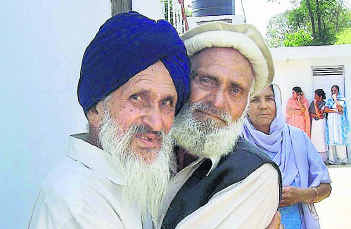 I had been sort of taking a wait-and-see approach to this news (pagh salute: preet) arriving out of England. It seems some punk kids started a blog to stir religio-ethnic hatred amongst Sikhs and Muslims. My hesitation was that I did not want to further enflame the story and further create the sort of reaction that the website had hoped.
I had been sort of taking a wait-and-see approach to this news (pagh salute: preet) arriving out of England. It seems some punk kids started a blog to stir religio-ethnic hatred amongst Sikhs and Muslims. My hesitation was that I did not want to further enflame the story and further create the sort of reaction that the website had hoped.
The blog of Jerome Taylor of the Independent had first written about the website and its intentions:
The website contains pictures of at least 25 Sikh women which the site’s administrators claim to have seduced alongside highly provocative remarks about the women and the Sikh religion.
Timed to coincide with the start of the university year – described in the site as a time when “[Muslim] soldiers go hunting for Sikh slappers” – the website’s creators encourage friends and readers to send in pictures of Sikh women they have seduced during freshers week.
The most vile part of the website was that it posted pictures of young women (that it claimed came from Sikh backgrounds) and wrote in the most nauseating way that males often talk. I did see the website and it was disturbing.
The current economic meltdown has made me reflect more and more on the role of community organizations/institutions during times of hardship and uncertainty. Our current economy is in bad shape, and we’re likely to feel the fallout in lost jobs, lost job openings, and lost homes/assets for months, possibly years, to come.
during times of hardship and uncertainty. Our current economy is in bad shape, and we’re likely to feel the fallout in lost jobs, lost job openings, and lost homes/assets for months, possibly years, to come.
What are our responsibilities to one another in times of crisis? The response is reliable and familiar for disasters, but with something as pervasive and private as personal finances and wealth, it becomes trickier. I have watched families fall through class brackets and learn to reevaluate their class identities and sense of pride in the context of previous recessions, but this recession seems like a harbinger of a deeper struggle to come.
Sikhi has a relatively clear requirement for service to others and wealth redistribution (daswand) from the more to less fortunate. What do we do when we find ourselves moving across classes or relative wealth? I would argue that now, more than ever, as people of faith our philanthropy, service, and efforts are needed in the same ways they would be for a disaster or catastrophe. We have an opportunity and moment to move beyond our personal egos and create support systems not only for the Sikh community, but for our larger communities. How many of our gurdwaras are located in areas that are impacted by the current mortgage foreclosure crisis and recession? Enough that I think we can make a difference.
I hope that in this stressful time we can rise to the occasion and get to know our neighbors by sharing and providing shelter, comfort, food, and resources. These dire times truly call for chardi kala and sarbat da bhalla, but we will be challenged to figure out what that means and how to make that happen in a time when all of us face uncertainty as individuals and community members.
In keeping with the recent Election 2008 theme on TLH, I ask you the following — which party do you think completes this sentence:
[x] believe that individuals should contribute time and resources to serving the poor, vulnerable, and less fortunate members of our society.
Do you think x refers to:
- Democrats; and/or
- Republicans.
From the Volokh Conspiracy:
Dear Senator McCain:
Repeatedly calling me and everyone else in the United States “my friends” is extremely annoying. In part, it’s just an irritating phrase. Beyond that, I’m not your friend. I don’t know you, and, from what I know of you, I don’t even really like you. Sorry to focus on such superficialities when the world economy is going to Hell, but you probably lost more votes with your constant repitition of “my friends” than from anything Obama said.
Sincerely,
David B. [link]
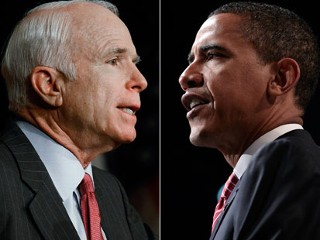 Reema (I’m signing on.)
Reema (I’m signing on.)
Both candidates used the phrase. And of course, because of my bias, it grated on my nerves when McCain used it. It was just amusing when Obama did. Anyone who is about to control my life and the lives of all US residents is not a friend, and they shouldn’t try to be. They just better know what they’re doing because everything (economy, environment- one in 4 mammals is threatened with extinction, social security, Medicare + Medicaid) seems to be falling apart at the same time. Not to be dramatic or anything. The only suggested economic solution from a Sikh point of view I found was vague, overly ambitious, and not really very palatable either.
Often on this blog we have discussed what role our institutions should play in our lives and recently I had an opportunity to examine the issue anew. In a recent gurdwara council meeting I attended, one gurdwara decided to give a large sum of money to a group putting on a bhangra program. The group was not affiliated with the gurdwara. I will admit, I did not say anything at the time because I do not attend the gurdwara that decided to do this, but the incident did get me thinking about gurdwara funds and the concept of daswand.
When a gurdwara collects funds from the sangat – it does so under the pretence that the money is being collected to be put to some higher use, a use that we ourselves could perhaps not put it to, whether it be spiritual or practical. Usually we give the money as part of our daswand or some random seva to the gurdwara, but I think in every case it is understood that we are giving the money up to be put to a use that our Guru’s would have used it for – something necessary, something practical, and fundamentally “good.”
And as I write this post, some questions that I haven’t even answered for myself come to mind – Is the daswand I give to the gurdwara something I have a right to control – can I decide where it goes? If Sikhi is to be treated like a democracy, I would argue that absolutely I have every right to “vote” on where the funds go or at least have a chance to say something. But even in such a vote – should there be limits? Shouldn’t the funds of a gurdwara be spent on activities, which embody Sikh ideals and values? Presently, I am inclined to believe that sangat should have a say in where gurdwara funds are spent, but also that the options for spending funds should be limited to projects that actually embody and promote Sikh ideals.
But back to where we started – I brought bhangra up because it is something that can be debated – I’m not contending that it is an anti-Sikh activity, but at the same time, I don’t really think bhangra is something that perpetuates the Sikh way of life either. So I guess the dilemma in my mind in determining where the gurdwara should be spending its funds and where to draw the line…
As part of its series on the upcoming federal elections in Canada, the Globe and Mail offers this article on the emergence and success of Sikhs in the Canadian political scene. Consider: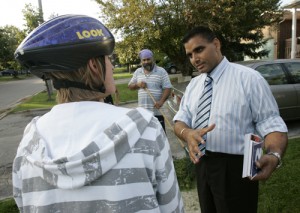
- Sikhs [are] the only group with a greater number of MPs than their share of the population.
- [In the House of Commons,] Punjabi is now the fourth most common language, after English, French and Italian.
- Many Sikh candidates live in Mississauga and Brampton, where they comprise 15 per cent and 19 per cent of the population respectively.
- [There are] 17 Punjabi newspapers in Brampton [Link]
These statistics are very impressive. I applaud the Sikh candidates for their participation in Canadian politics (which cuts against the suggestion that Sikhs are not sufficiently integrating into Canadian society). And I thank this publication for highlighting the political advancements that Sikhs are making in Canada.
That said, I am troubled by two parts of the article:
The NYT recently covered the rising admission of Muslim students in Catholic schools, unsurprisingly, because there is a greater freedom to practice their faith in Catholic school than in “secular” public schools:
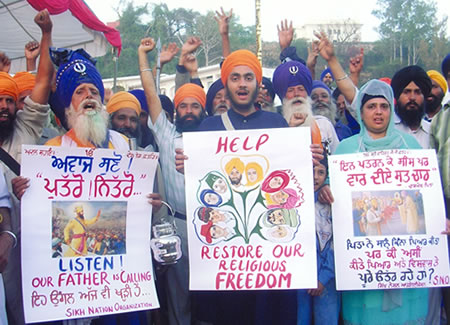
“There is respect for our religion here,” said Nadia Oualane, 14, a student of Algerian descent who wears her hair hidden under a black head scarf. “In the public school,” she added, gesturing at nearby buildings, “I would not be allowed to wear a veil.”
The experience of French Muslims mimics the crushing oppression that Sikhs and other religious minorities face under France’s harsh and discriminatory anti-religious policies:
The quiet migration of Muslims to private Catholic schools highlights how hard it has become for state schools, long France’s tool for integration, to keep their promise of equal opportunity…
Imam Bencheikh’s oldest daughter attends Catholic school. “It’s ironic,” he said, “but today the Catholic Church is more tolerant of — and knowledgeable about — Islam than the French state.”
In a recent state meeting between the French and Indian PMs, Sarkozy and Singh, respectively, reporters used the opportunity to reopen the question of how the religious ban has impacted Sikhs. Sarkozy ignored the disparate impact of the ban by claiming that its uniform application meant it had no discriminatory intent [Hat tip, Tejinder]:
Visibly irritated, Sarkozy continued, “But sir, we have rules, rules concerning the neutrality of civil servants, rules concerning secularism, and these rules don’t apply only to Sikhs, they apply to Muslims or others. They apply to all on the territory of the French Republic.”
His comments, however, about the universal nature of this ban are contradicted by his Minister of National Education, who indicates that there is an explicitly anti-hijab and anti-Muslim intent behind this policy:
“The head scarf is a sexist sign, and discrimination between the sexes has no place in the republican school,” France’s minister of national education, Xavier Darcos, said in a telephone interview. “That is the fundamental reason why we are against it.”
Muslim enrollment in Catholic schools is facilitated, in part, by marginally “freer” religious practice options, but also by the idea of a shared Abrahamanic history and God. Where do Sikhs find refuge, both in the context of education and religious practice, given their distinct history, practice, and interaction with Judeo-Christian institutions? France’s ban has been decried by human rights organizations and religious organizations, but little positive action has taken place against the ban. Indeed, in some cases the State’s reaction seems retaliatory.
I got this cute video link via ASATA and wanted to share it with TLH. It talks about Italy’s desi-Sikh minority, relations between Italians and Sikhs, and the role of Sikhs in Italy’s cheesemaking industry
